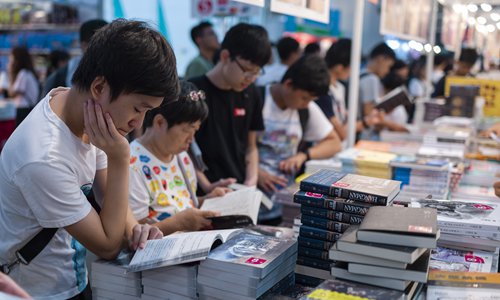Politically agitative books by activists disappearing in HK
Source:Global Times Published: 2020/7/5 12:46:35

Readers at the Hong Kong Book Fair Photo: IC
Public libraries and bookstores in Hong Kong have started to remove and suspend books with politically agitative content written by some Hong Kong activists, after the National Security Law for Hong Kong Special Administrative Region (HKSAR) came into effect.
Local news outlets said public libraries in the finance hub have gradually removed all nine "politically sensitive" books, including those from riot leader Joshua Wong, Wan Chin, a writer known for the "Hong Kong city-state" series, and lawmaker Tanya Chan.
Although some of those books are still available and are placed conspicuously in bookstores in Mong Kok and Causeway Bay, Wong's book can no longer be seen in most stores, media reported.
Local media hk01.com said that books related to political movements have been popular in Hong Kong despite the local government's criticism of them. Many readers can easily find them due to their conspicuous display.
In a bookstore at Mong Kok, hk01.com found that slogans on book covers such as "Free Hong Kong, Revolution Now" were covered with tape on a book titled "Struggle under Tyranny."
A staff member told media that they will pay more attention to the content of the books in the store.
Despite Wong's complaint on Twitter on Sunday that banning his book suggested an "Orwellian society of the 21st century," many local internet users said it was inspiring to see those books' disappearance, as such "treasonous propaganda did nothing but destroy the mind of the youth."
"Those books (written by Joshua Wong) are relatively old and have limited reprints," a staff member told hk01.com.
"That rubbish should not be regarded as books, which should enrich the knowledge and soul rather than bring meaningless destruction with fallacies and negative words," said a Hong Kong resident, noting that the National Security Law for HKSAR is undoubtedly a deterrent for those meddling in Hong Kong.
"In fact, few people borrow these books from libraries, and it is strange that libraries bought them in bulk before," said another, indicating that their previous existence was due to the "response" of foreign forces.
The National Security Law for HKSAR came into force on Tuesday, and clearly identifies four types of offenses: secession, subversion, terrorist activities and collusion with a foreign country or with external forces to endanger national security.
Posted in: SOCIETY,HK/MACAO/TAIWAN